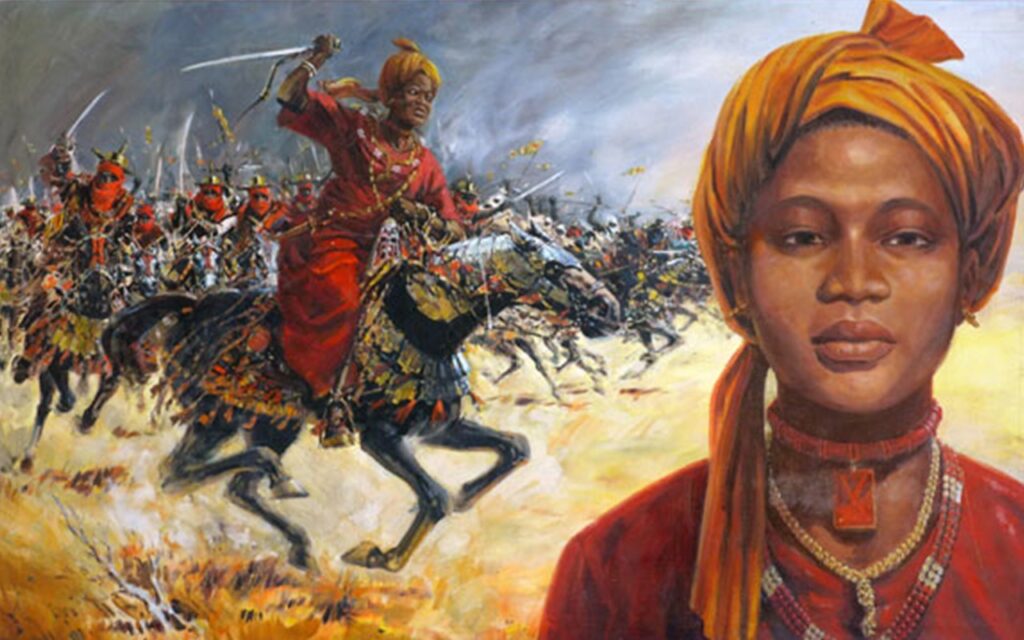When discussing Africa’s history, powerful female rulers often take center stage. One such figure is Queen Amina of Zazzau, also known as Amina of Zaria—a 16th-century warrior queen from what is now Northern Nigeria.
Her story is a reminder that African women have historically played leading roles in politics, war, and leadership. Let’s explore the life of this legendary queen and how her legacy continues to inspire today.
Who was Queen Amina?
Born around 1533, Queen Amina hailed from the Hausa city-state of Zazzau, one of the ancient Hausa Kingdoms in Northern Nigeria. She was the daughter of Bakwa Turunku, the ruler of Zazzau, a state located in the present-day Kaduna State of Nigeria.
Amina was brought up in a royal household but quickly distinguished herself for her boldness and ambition. Unlike other royal women of her time, Amina preferred military pursuits to domestic roles.
After her mother’s death, Amina ascended to the throne in the early 1570s. But even before becoming queen, Amina had earned a reputation as a fierce and skilled warrior. She had led numerous military campaigns as the head of the Zazzau cavalry.
A Strategic Military Leader
Queen Amina’s reign was marked by military expansion, a strategic approach to warfare, and political astuteness. She led her army in multiple conquests, extending the territory of Zazzau beyond its borders, which now includes parts of present-day Nigeria, Niger, Chad, and Cameroon.

She is credited with fortifying cities by building walls known as “Amina’s Walls,” some of which still stand today. These walls were a military strategy to protect the cities she conquered and strengthened her control over trade routes. Zazzau became a powerful kingdom under her leadership, benefiting from the flow of trade, especially in goods like kola nuts, leather, and salt.
A Legacy of Empowerment and Leadership
While her military prowess earned her renown, Queen Amina’s rule was also characterized by strong governance. She demanded tribute from the regions she conquered, strengthening her kingdom economically and politically. Her legacy is still alive today in Hausa culture and beyond.
Queen Amina stands out as an emblem of female leadership in Africa’s rich historical tapestry. Her courage and ability to lead in a male-dominated military sphere are still inspirational for African women and girls who seek to break barriers in their societies.
Why Queen Amina Matters Today
In the context of African history and leadership, Queen Amina is more than just a historical figure—she is a symbol of female empowerment. In many societies, women are often not associated with leadership, especially in the military or political realms. Yet, Queen Amina defied these gender norms, proving that women can lead not only their families but entire kingdoms to prosperity and greatness.
Her life encourages a reflection on the historical roles of African women in leadership and power. By learning about Amina and other African queens and warriors, we recognize that women have always been integral to the political and cultural landscape of Africa.
As we honor Queen Amina, we can draw parallels to modern African female leaders and continue advocating for gender equality. In a world where women’s leadership is still challenged, Amina’s story reminds us that African women have always been capable of extraordinary leadership.
Queen Amina of Zazzau remains an iconic figure in African history, a warrior queen who expanded her kingdom and left a lasting legacy. Her story teaches us about strength, strategic leadership, and the power of women to shape the world. By remembering figures like Amina, we continue to draw inspiration from Africa’s rich history and heritage.

